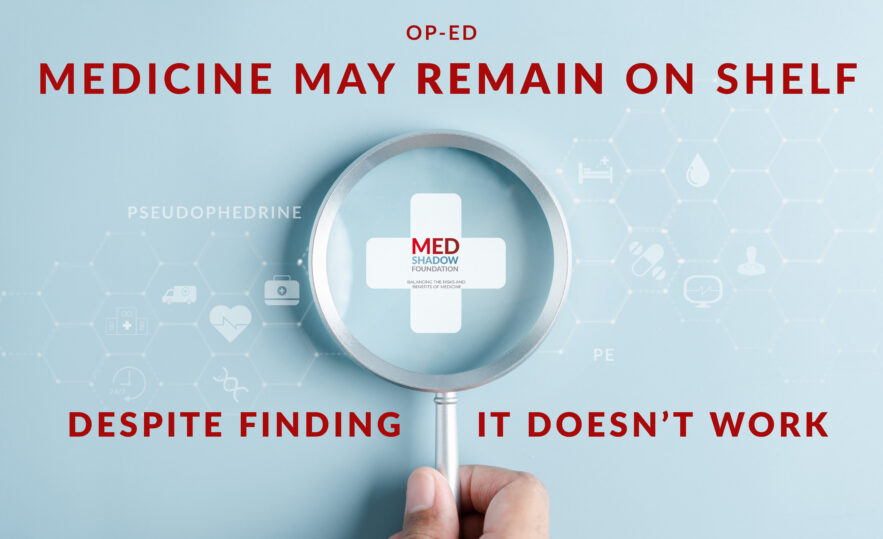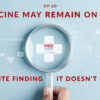The world has gone crazy, or maybe it’s just the doctors. Every doctor knows that every medicine has side effects. A core ethic of the profession requires doctors to balance the expected benefits of the medicine against the risk of side effects. The simple question is: is this drug likely to do more good than harm? If yes, alert the patient to the risks and then prescribe. If the answer is no, look for another way to treat the patient.
What is the result when research finds that a medicine doesn’t have the beneficial effect earlier studies indicated? Simple: a drug on the market that doesn’t help cure exposes a patient to side effects (harm) for no benefit.
Why would anyone take — or prescribe — a drug that doesn’t work and can harm? But that is precisely what the Food and Drug Administration (FDA) is debating right now.
Thanks to the dogged persistence of Randy C. Hatton and Leslie Handeles the FDA has finally put the multiple studies in front of an FDA Advisory Committee who unanimously agreed that the evidence shows that the active ingredient in the over-the-counter drug Sudafed PE doesn’t relieve sinus pain or congestion when taken by mouth. That ingredient, phenylephrine, is also found in many combination drugs such as Benadryl Allergy Plus Congestion and PediaCare Children’s Decongestant.
Sudafed vs. Sudafed PE, What’s the Difference?
The similarity between the two names creates confusion. Sudafed (no PE after the name) is a drug that is effective for congestion but has restrictions to getting it. You don’t need a prescription, but you do have to ask for it at the pharmaceutical counter and show ID. Sudafed’s primary ingredient is pseudoephedrine and it is very effective for decongestion. Unfortunately it can also be turned into meth in a home lab (meaning an amateur scientist would have little trouble turning into an addictive and dangerous drug).
When the FDA moved Sudafed behind the pharmacy counter the pharmaceutical company quickly released a new and different decongestant, phenylephrine, using an almost identical name, Sudafed PE. In this apparent “bait and switch” the pharmaceutical company used the same name (with an addition of two initials that seem unimportant) to sell a different, ineffective drug. This drug is on the shelf along with all the other cold and flu remedies. And its main ingredient, phenylephrine, is now used in many combination cold and flu remedies.
Will Sudafed PE Be Taken Off the Market?
Since phenylephrine does not work, we can expect the FDA to step in to tell doctors to stop recommending it, have Sudafed PE taken off the shelves in pharmacies, and ensure it is removed from multi-ingredient cold and flu drugs, right?
Even though the research was conclusive, the FDA has called a meeting of the Nonprescription Drugs Advisory Committee in September 2023 to discuss what to do with the new information about Sudafed. Advisory Committees are usually called when the FDA finds the data unclear or the risk/benefit balance of a drug is difficult to assess. The meetings are convened to review research, have an open discussion, and offer opinions on what the FDA should do. Advisory Committees are overwhelmingly made up of doctors, researchers, pharmacists, sometimes a patient rep, always an industry rep and always a consumer rep. (Disclosure, I am the appointed Consumer Rep on the FDA Drug Safety and Risk Management Committee).
Good job by the Consumer Rep on the committee, who spoke up.
“I feel this drug, in this oral dose, should have been removed from the market a long time ago,” said Jennifer Schwartzott, the patient representative on the panel. “Patients require and deserve medications that treat their symptoms safely and effectively, and I don’t believe that this medication does that.”
Nervousness, Dizziness, and Sleeplessness Are Not a Safety Issue, According to the FDA
Shockingly, the FDA is now “considering” removing phenylephrine from the “GRASE,” Generally Accepted As Safe and Effective list of drugs. Why?
The FDA released a press release assuring the public that it is safe to continue to use products containing phenylephrine.
But the side effects of phenylephrine include nervousness, dizziness and sleeplessness. Yes, none of these are likely to cause long-term harm, but they can certainly intrude on your day and make you feel even sicker than before taking the medicine. Not everyone can stay home in bed when congested. If you need to drive a car or take care of small children, dizziness, nervousness and exhaustion from sleeplessness are definitely a safety issue.
What Can I Do to Relieve My Congestion?
Chicken soup! Hot liquid and steam from any broth-based soup may help open up swollen airways and thin out mucus. It also soothes a sore throat, tastes good and nourishes you.
Neti pots and nasal irrigation: Yes, they can be messy to use, but they do ease congestion.
Warm-water vapor (steam inhalation) helps loosen mucus, which feels good. Though it’s unclear whether that change translates into reduced congestion, many people swear by it. Try making your own home sauna by heating water (don’t boil, because that’s too hot), put a towel over your head as you lean carefully over the water. The towel will trap the steam, so it concentrates toward your sinuses. Be careful. If it feels too hot, it is. A hot shower may be safer than putting your head over a piping-hot pot of water.
Which PE Meds Do Work For Nasal Congestion?
Phenylephrine doesn’t work in an oral pill form because the drug breaks down in your kidneys, creating unnecessary stress for your kidneys and allowing your body to get rid of the phenylephrine before it can do its job to decongest. Phenylephrine does help clear congestion when used in nasal sprays and drops because it enters your body without going through the kidneys. Unfortunately, most people prefer taking a pill to using a spray or drop.
More than half of all Americans use phenylephrine either on its own or in a combination cold/flu remedy every year, with many of those households using it multiple times a year. This is a waste of your money and delays you in getting better.
Why can I get Sudafed PE right off the shelf and for “real” Sudafed I have to go to the counter?
For many years, pseudoephedrine was available OTC without identification and interaction with the pharmacist, but the FDA put safety precautions in place because it is easy to abuse.
Pseudoephedrine can be turned into Methamphetamine (meth) in home labs, so the FDA decided in 2006 to make it more difficult to purchase a quantity large enough to be turned into an addictive, illegal, and dangerous drug.
Sudafed PE/phenylephrine, being a slightly different chemical formation, cannot be turned into meth, making it safer to sell directly to the public. But yet, it doesn’t work for its actual intent to decongest.
When drugs are sold that don’t work, three things happen to you or family members taking that drug:
- You do not receive care for your illness.
- You may suffer from side effects with no possibility of benefit.
- Effective care is delayed or never started.
Check your medicine cabinet and purge it of drugs that don’t work. Use the nasal spray version or, better yet, try a nasal wash and other non-drug methods to reduce congestion.
And — FDA — do your job and protect us all from ineffective and dangerous drugs.
In the U.S., every over-the-counter drug that is a decongestant or is a combination including a decongestant will have phenylephrine. For your reference, here is short list of the most common OTC meds that include phenylephrine (which is not effective for relieving congestion):
- Sudafed PE Sinus Congestion
- Children’s Sudafed PE Nasal Decongestant
- Suphedrin PE
- Benadryl Allergy Plus Congestion
- PediaCare Children’s Decongestant
- Lusonal
- Vicks DayQuil
- and their generic forms.
Here is an abbreviated list of products that contain pseudoephedrine (the effective drug for clearing congestion). To get any of these products you will have to go to the counter at the pharmacy:
- Sudafed
- Claritin-D
- Zyrtec D
- Advil Cold and Sinus






